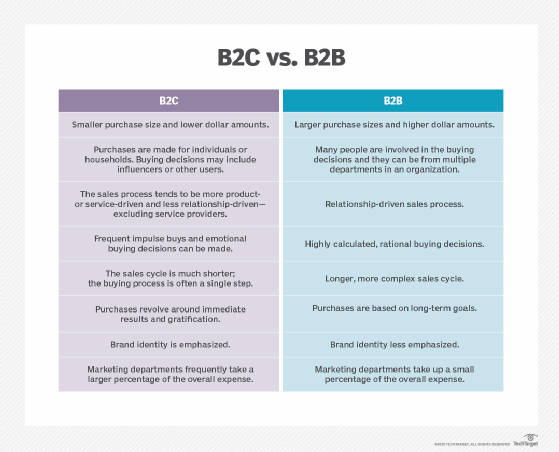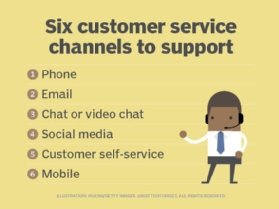What is B2B2C (business-to-business-to-consumer)?
B2B2C (business-to-business-to-consumer) extends the B2B (business-to-business) model to include e-commerce for consumers. The goal is to create a mutually beneficial relationship between suppliers of goods and services and online retailers.
How B2B2C works
B2B2C can help a company market its product or service more effectively by entering a B2B relationship with a company whose expertise is selling online -- a B2C (business-to-consumer) company.
In return, the B2C company can offer its customers more options. Often, a third entity serves as a middleman to move goods between the provider and the e-commerce vendor or to aggregate customers the other two parties want to reach. This relationship can create a seamless experience for consumers, as they can access a wider range of products and services through a single platform. This intermediary role is crucial for logistics, customer data management and streamlining of the transaction process.

Benefits of B2B2C
In a B2B2C arrangement, the product or service provider might pay the B2C e-commerce company for sales leads, actual sales or the names of users of its e-commerce site, as well as for help building brand recognition.
The B2C company might also earn a share of the revenue from the products and services it sells or gain new customers who are interested in the business partner's offerings. This symbiotic relationship enhances market reach, optimizes resource utilization and drives revenue growth for both parties.
Challenges in B2B2C
B2B2C can raise significant issues in integrating the business processes and IT systems of the partners, especially back-end systems, such as accounting, enterprise resource planning (ERP) and warehouse management. Transactions on the e-commerce site might need to be recorded in the back-end systems of the partner company.
Price changes in ERP might have to be reflected on the e-commerce site. Data synchronization and system compatibility are critical factors that need to be addressed to ensure smooth operations and accurate reporting.
Technology and platforms for B2B2C
Vendors of enterprise e-commerce platforms often have omnichannel features. Demandware, IBM, Oracle and SAP Hybris are the main purveyors of B2B2C technology, though some ERP vendors also offer it.

These platforms provide comprehensive offerings for integrating multiple sales channels, managing customer data and facilitating smooth transactions across different systems.
Industries suited for B2B2C
Industries that have traditionally relied on distribution channels and resellers, including manufacturing and pharmaceuticals, are considered prime candidates for B2B2C. Other sectors, like consumer electronics, fashion and automotive, are also increasingly adopting the B2B2C model to enhance their market presence and customer engagement.
Ultimately, the B2B2C model is evolving rapidly with technological advancements and changing consumer preferences. By using the strengths of both B2B and B2C approaches, businesses can create a more efficient and customer-centric ecosystem, driving growth and innovation.
Learn more about the differences between B2B vs. B2C e-commerce. Also, read up on the top e-commerce marketing platforms to consider.